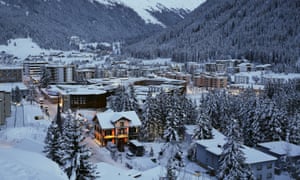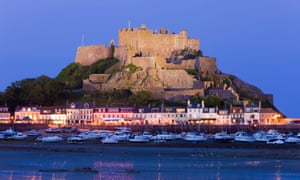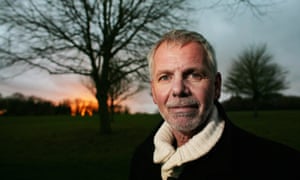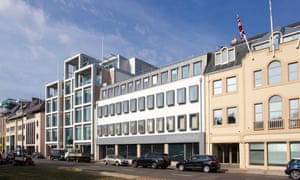
Davos: ‘This week, some of the richest people on Earth will gather high up a snowy mountain in the world’s biggest tax haven.’ Photograph: Ruben Sprich/Reuters
As metaphors go, this one takes some beating. This week, some of the richest people on Earth will gather high up a snowy mountain in the world’s biggest tax haven. Most will have paid big money to attend the three-day meeting in Davos: the most exclusive memberships cost somewhere in the region of £100,000 each. From there, they will relay thoughts on global risks and opportunities to the ski-jacketed press corps. They will talk about gender inequality and technological innovation. The message will go out: however turbulent the global economy, it is being capably stewarded.
These are our economic elites as they want the rest of us stuck on the flatlands below to see them: big-thinking, well-intentioned, hard-working – and thoroughly meritocratic. This is also how they justify the mammoth rewards they enjoy: we sweat for it; we’re worth it. The follow-up is usually only implied, but it is the one that underpins the entire system: put in enough hours and this could be you.
Set against that promise the finding from Oxfam that 62 billionaires have more wealth than half the world’s population – 3.5 billion people – share between them.
Ponder those numbers for a moment because they make up possibly the most grotesque ratio in the world economy today. Go through the 62 richest people and plenty of names jump out to show that any notions of meritocracy are a big fat lie. None of those 3.5 billion men, women, boys or girls will be born into a fortune such as that enjoyed by the Waltons of Walmart fame, in which just six people own $149bn. Nor will they ever get to be a Saudi royal such as Prince Alwaleed bin Talal, worth $26bn.
I could pull out plenty of other names giving the lie to the complacent notion that this is the era of the self-made plutocrat. The top of the money tree is still festooned with inheritances. Just look at the widow of chocolatier Michele Ferrero, Maria Franca Fissolo, who at 98 is the fifth wealthiest woman on the planet; the offspring of the Lidl and Aldi dynasties and the three Mars siblings who are worth $80bn. One doesn’t need to be a Bolshevik to see that many of the world’s super-rich are recipients of dumb luck, born into the right family at the right time.
But that grotesque index tells us that something else has gone badly wrong. At the start of this decade, 388 billionaires owned as much as half the world. By 2011, that number had plunged to 117. Last year, it had fallen to 80. In other words, in the five years since the world recession, the very richest have grown inexorably wealthier. And that’s not because the global economy is booming, as every worker on a pay freeze and every family seeing their benefits cut knows. It’s because we are living in a period of trickle-up economics, in which the middle- and working-classes have handed over money to those right at the very top.
The 80s were the decade of trickle-down economics, with Thatcher and Reagan cutting taxes for the richest and promising that everyone else – from Easington to Port Talbot, Pittsburgh to Milwaukee – would soon feel the benefits. By contrast the past half-decade has been about trickle-up economics, in which the world’s most powerful central bankers have launched policies that have been explicitly about boosting the fortunes of the richest. The disbursement of thousands of billions in quantitative easing both in the US and the UK from 2009 onwards was meant to raise asset prices – and assets are by definition in the hands of the wealthy.
No wonder the Bank of England admitted that 40% of the gains from its £375bn QE programme went to the top 5% of British households. No wonder Stanley Druckenmiller, the billionaire hedge fund manager, labelled QE: “The biggest redistribution of wealth from the middle-class and the poor to the rich ever.”
The figures prove him right. According to the Berkeley economist Emmanuel Saez, between 2009 and 2012 the top 1% of American households took 91 cents out of each extra dollar that the country earned. The other 99% of Americans had to share the remaining 9 cents between them.
This didn’t happen in a fit of absent-mindedness. Rather, decades of burgeoning inequality – of the Davos set scooping more and more of the gains from growth – have enabled the super-rich to pretend that their narrow sectional interests are what’s good for the world economy. Policies as manifestly unfair as QE would never have happened in a fairer economy – the UK and US would have relied instead on public investment and government programmes.
Massive inequality has allowed the 1% to buy political influence as never before in postwar history. Indeed, the super-rich now practically write their own tax laws – such as the way senior executives of Britain’s biggest businesses were invited by George Osborne to advise on overhauling corporation taxes. They get to ensure that tax havens are treated with due leniency, all the better to hide their trillions in them. They buy their own politicians, as with the shadow-bankers who funded the Conservative election campaign or the billionaire Koch brothers using their fortune to tip the US presidential contest. Indeed, the more ambitious decide to become politicians. Think not just of Donald Trump but former bond trader turned media mogul turned mayor of New York Michael Bloomberg.
The great mistake made by the mainstream left and right, even by NGOs such as Oxfam, is in imagining that the super-rich, now enjoying such massive riches, are somehow playing by the same rules as the rest of us. That they are “wealth creators” providing jobs and investment for the rest of us, or that they might give up their tax havens. If that ever were the case, it isn’t now. A tiny minority has gained from massive tax cuts and legislative leniency about where they shove their money. They have siphoned off gains in salaries and profits wherever possible and enjoyed hundreds of billions flowing into their asset markets. Meanwhile, the rest of us who provide the feedstock for their revenues see our welfare states hollowed out, our wages frozen and our employers failing to invest. But none of that matters very much in Davos.







